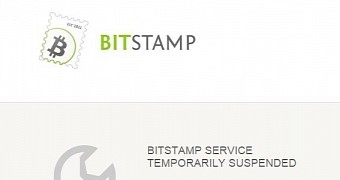The services of Bitstamp crytocurrency exchange have been suspended and no payments are currently made, as the company suspects that the operational wallets were compromised on Sunday.
A warning is now available upon accessing the website, advising users not to use any of the bitcoin deposit addresses issued before January 4, 2015, because they may no longer be under Bitstamp control.
Online wallets have been affected
The nature of the problem has not been explained by Bitstamp representatives, but it appears to be a security breach that occurred over the weekend.
“Bitstamp takes our security and soundness very seriously. In an excess of caution, we are suspending service as we continue to investigate. We will return to service and amend our security measures as appropriate,” reads the announcement.
The wallets suspected to be affected are used for daily online operations and do not represent the assets entrusted to the company by its customers. The rest of the digital money is saved in offline repositories, and have remained untouched.
Money is safe, CEO says
Customers received assurance that all deposits made before 9:00 UTC on January 5, 2015, are fully covered and they have nothing to worry about. On the same note, all deposits made to the addresses issued after this timestamp will also be honored.
Nejc Kodrič, CEO of the company, who was in transit to Las Vegas for this year’s CES trade show, also wanted to restore confidence in the service and tweeted that most of the bitcoins were in “cold storage,” meaning that they are saved on devices that are not connected to the Internet.
“Bitstamp maintains more than enough offline reserves to cover the compromised bitcoins,” the company representatives said in the announcement.
Founded in Slovenia, Bitstamp is currently based in the United Kingdom and it has grown to be one of the most trusted services for transacting bitcoins.
This is not the first time the exchange service is disrupted. In early 2014, the company had to suspend its activity for several days because of a distributed denial of service that had extortion as its purpose.
Also, the name of the company has been used numerous times in phishing attempts looking to steal customer credentials. Towards the end of 2013, the company started to require account holders to provide copies of official documents for identity verification, as well as papers attesting to their home address.
To restate: the bulk of our bitcoin are in cold storage, and remain completely safe.
— Nejc Kodrič (@nejc_kodric) January 5, 2015

 14 DAY TRIAL //
14 DAY TRIAL //